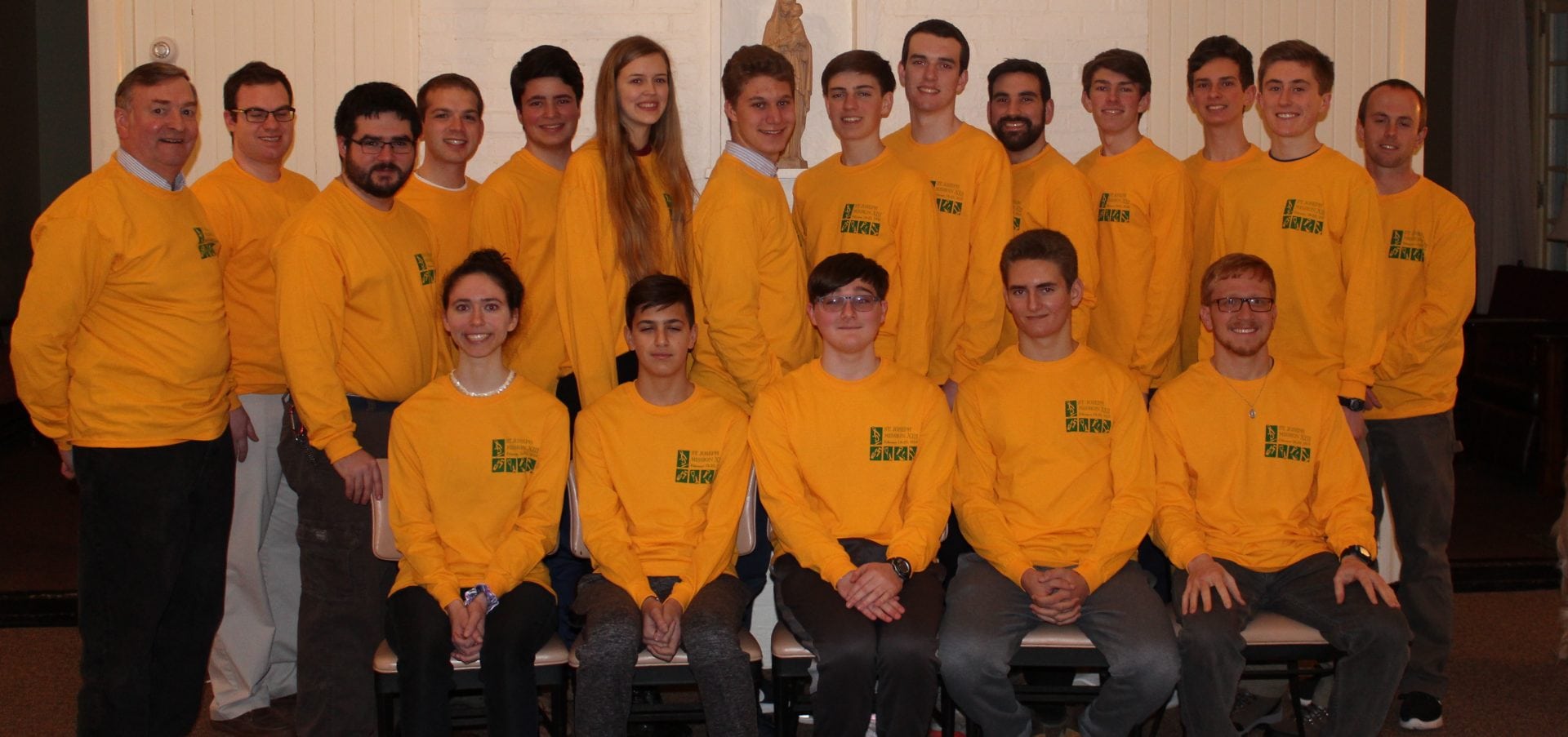Matt Maher on communicating faith, creating a clean heart, and bridge-building among Christians

P
Catholic singer-songwriter Matt Maher is the dad of three kids under the age of six, and he realizes that they learned to talk by echoing what they heard him and his wife say.
With that in mind, Maher came to see that Christianity is similarly spread through the echoes of other Christians’ words and actions. Therefore, he named
his latest album “Echoes,” because it shares songs that reflect the life-affirming truths of the faith, both in times of national divisiveness and personal struggle.
During an interview on “Christopher Closeup,” Maher explained that he was a cradle Catholic, but didn’t take his faith seriously until he turned 20. Looking back at the years he spent working for the Church in Phoenix, he said, “So much of my faith was formed by listening to the people around me and the things they said and emphasized. And I turned around and did the same thing.”
While affirming the importance of catechesis, Maher believes we have to develop a more personal approach to passing on our faith in everyday life. But the modern world often makes that difficult and even distorts it.
He said, “Most people, now, are communicating ideas by sharing something someone else said. They call it confirmation bias. You have a belief – whether it’s religious, political, economic, or social – and you read something online and it appeals to you on an emotional level…We turn around and share things that other people say and we create an echo…without even thinking, ‘Wait, do I actually completely line up with this? Do I agree with this in one aspect but this other aspect is not consistent with what my faith teaches?'”
Maher encourages us to listen for the authentic call of Jesus instead: “He’s the one whispering in your ear the desire to improve yourselves, making your life more fraternal to improve society…telling you to dream the big dreams, to live life abundantly. What [Anglican theologian] N.T. Wright said was, ‘All of humanity hears the echo of a voice who calls for the wrong things to be made right.'”
Making things right is something that starts with each of us individually, a message Maher shares in his timely and relevant song “Clean Heart."
[Verse 1]
Woke up this morning
The whole world was yelling
I wish I was dreaming
Of all that we’ve been through
My soul has been searching
For some deeper meaning
I know there’s a kindness
That leads me to the truth
[Chorus 1]
When everybody’s looking for another fight
When trouble’s on the rise, no end in sight
Oh Savior, won’t You come and make the wrong things right
Let me be the place You start
Give me a clean heart
That song originated with Maher’s wife telling him she felt like he should write a song based on Psalm 51. He related it to “this age of divisiveness” and our uncertainty about how to respond, coming to realize that “you can’t change anyone else. You can only change yourself. And even that you can’t do without the grace of God. There’s a reason why Mass, after the opening song, begins with the Confiteor. Those are the words in Latin: mea culpa, mea culpa, mea maximum culpa – through my fault, through my fault, through my most grievous fault. That’s everybody’s starting point. It’s not just the starting point for the pagan [or] the atheist [or] the marginal Christian. It’s the starting point for everybody.”
Though it’s the starting point, Maher explains, the humility of admitting our faults should lead us to repentance and mercy: “The second verse of [Clean Heart] talks about mercy. I think there’s a reason why Jesus said to Saint Faustina that mercy is an ocean. He didn’t say ‘lake,’ he didn’t say ‘river,’ he didn’t say ‘symbol.’ He said ‘ocean.’ Like, the thing that covers 90% of the Earth. That was in me when the song was written. And the bridge talks about, from the cross, Jesus blessed His persecutors. He blessed those who were mocking Him, and so that’s the mandate on the life of every Christian.”
Another hallmark of Christianity is the call to be joyful, but it’s not a call to which all Christians respond. Maher notes that the things to be stressed out about are never-ending for him and for everyone else in the world, but that his kids remind him of the need for joy every single day. And his song “What a Friend” takes inspiration from the relationship that we can have with Jesus, in whom we can find our joy.
So why can joy be so hard to find among fellow believers? Maher says, “One of my old priest friends, when he was in seminary, their theology professor was giving a lecture on joy. He gave this whole textbook thing and at the end of it he said, ‘And men, remember this. Joy is no laughing matter!’ …I think that’s in some ways the problem. We just take ourselves too seriously. There was this great quote by C.S. Lewis. It literally describes western society right now. He said, ‘We must picture hell as the state where everyone is perpetually concerned about his own dignity and advancement, where everyone has a grievance and where everyone lives with the deadly serious passions of envy, self-importance and resentment.’ I think the self-importance part is really [vital], particularly for people in ministry, because I think when you have a platform, it can feed your narcissism. All of a sudden, you think that you’re really integral to the mission of Jesus – and that’s not the point. God doesn’t need us to advance the kingdom, but He loves us.”
That ties into Maher’s disagreement with the idea that we should let God “use” us to do His will. He cites Pope John Paul II’s statement that “the opposite of love isn’t hate; it’s use.”
Maher continues, “I don’t want God to use me. To use somebody implies that you don’t care about them. You’re treating them like an object. To me, I want to be in a relationship with God and with the church. The process of living that out is messy and difficult – and we need grace to do it. And if there’s not evidence of joy in my life, then that’s something I need to talk about with someone and with the Lord.”
Having a reposit of joy to fall back on was crucial to Maher during this past year when his father fell ill, was put into a medically-induced coma due to renal failure, and died about a week later. Maher’s cousin was visiting his dad during the last moment he was still lucid, when he said, “Get Matt, I need to get right with God. I need God to forgive me.”
Maher didn’t make it to the hospital in time to hear what his dad wanted to say, but he spent a week at his bedside while he was in a coma, simply praying with him and for him. “It was a profound, holy experience, and it’s forever changed me,” he said.
Moments of suffering are woven into the fabric of “Echoes,” even in songs that are fun and joyful, such as “What a Friend.” Maher notes that many faith-affirming hymns of year’s past were inspired by periods of pain and doubt. And his version of the hymn, “Just As I Am,” was originally written by Charlotte Elliot during “a time of existential crisis about her faith.”
Maher wrote his version shortly before his father entered the hospital, but came to see how it relates to his dad’s appeal for God’s mercy:
[Verse 1]
In shackles and chains, I came to Your door
And fell on the floor of mercy
Guilty I stood, guilty I was
I couldn’t hide my shame
[Chorus 1]
Just as I am, just as I am
Jesus, You welcomed me, You took me in
I’ll never be the same again
My life held in Your hands
Just as I am
Maher says, “One of the things I love about being Catholic is our understanding of mercy and God’s capacity to forgive people. It goes beyond our human understanding, so that song has become permanently linked to those moments in my father’s life, which I don’t know anything about this side of heaven.”
Beyond music, Maher is involved with the John 17 movement, which recently met with Pope Francis. It seeks “relational reconciliation” between Protestants and Catholics.
This issue is important to Maher because he’s one of the few Catholics working in the Contemporary Christian Music world. Grounded in Jesus’s plea, “Father, may all who believe in Me be one so the world will know You sent Me,” it began with Bishop Olmsted from Phoenix and several evangelical pastors taking a slightly different approach to ecumenism.
Maher explains, “Ecumenism, for the past 100 years, has been largely academic in its endeavor, and it’s mostly been people coming together, publishing joint papers, having high-brow conversations about important, substantive differences. Please note: I don’t think ecumenism is about not discussing those substantive differences, because they’re big and they have big implications.”
But prior to the second Vatican Council, there was this idea that “if you’re not Catholic, you are anathema. The Council Fathers got together and prayed through [the issue]. What the Holy Spirit helped illuminate to them is that we’re all Christians … following Jesus on a journey towards Jerusalem. And on the way, God wants to bring us to a closer and closer state of full communion with each other. Now, that isn’t going to happen by the universal Church compromising the teachings of the Magisterium because that’s not what ecumenism is. However, what can happen is that the foundational truths that Christians of all denominations share can be the basis for a friendship to form. Essentially, it’s saying, ‘Listen, we’re headed in the same direction and we’re both trying to love Jesus. We should stop beating up on each other and get to know one another.’ Practically speaking, if Christians can be unified publicly in their proclamation of Christ, it shows a divided world that it’s possible to have areas of agreement in the midst of so much disagreement.”
That hopeful approach is also what Maher wants to leave listeners with when they hear “Echoes.” He concludes, “My hope is that it helps them reframe how they’re looking at life in the current age. And from a worldview and a lens that’s more optimistic, it’s more focused on declaring God’s faithfulness, rather than just being fixated on how broken the world is. I think it empowers them to be able to do that, even in the midst of suffering. Many of the songs really are sort of a response to different aspects of suffering, and so my hope is that would inspire people in their response to whatever hardships they find themselves or their families going through, or their communities going through.”
Aletetia - Tony Rossi | Oct 31, 2017





























